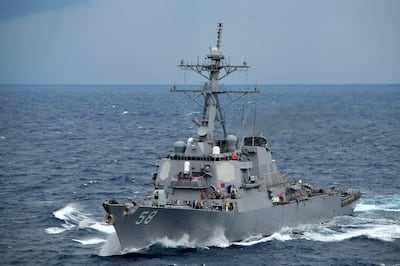Live updates: Follow the latest news on Israel-Gaza
The US and its allies should step up strikes on the Houthis to secure international shipping and avert the spread of a regional conflict, the deputy chairman of Yemen's Presidential Council and president of the Southern Transitional Council has said.
Aidarus Al Zoubadi further urged the US and its allies to support troops from his government in an anti-Houthi coalition – and take tougher action against Iran.
In an interview with The National at the World Economic Forum in Davos, he said the Houthis had left the region on the edge of conflict, emboldened terror groups such as ISIS and Al Qaeda in the Arabian Peninsula and left Yemenis across the divided country starving.
“The Houthi escalations in the Red Sea are unacceptable. Maritime navigation must be protected,” he said.
“And the US air strikes in their current form are not enough.
“There should be a comprehensive approach – militarily, politically and economically – against the Houthis.”
On Monday, the United Kingdom Maritime Trade Operations, which works with Britain's Royal Navy, said a vessel was struck with a missile 177km off Aden, which serves as the capital of the southern state.
The US military's Central Command later said the Houthis were behind the attack.
“Attacks to prevent Israeli ships or those heading to the ports of the occupied Palestine will continue,” senior Houthi spokesman Mohammed Abdulsalam said.

The US shot down a missile aimed at the USS Laboon in Red Sea overnight, with no damage or injuries reported.
UK Defence Secretary Grant Shapps said Britain would “wait and see” whether to strike Houthis again or not.
Support for Yemeni ground troops
Speaking in Davos, Mr Al Zoubadi said the US had not co-ordinated strikes with his government but urged decision-makers to back his troops against the Houthis.
His government comprises forces linked to the Southern Transitional Council and the Presidential Council.
“There has been no co-ordination. However, secure maritime navigation is a responsibility that falls not only on Yemen, not only on the region but the international community.
“The way to address this is for there to be a comprehensive military operation that involves regional stakeholders to stop the piracy operation in the Bab Al Mandeb and, [more] importantly, to support ground forces, STC and PLC forces, on the ground.”
Only 32km across, the Bab Al Mandeb is the most vulnerable chokepoint for international shipping in the waterway, through which about 12 per cent of global shipping trade passes.
Mr Al Zoubadi did not back US forces on the ground in Yemen – a measure already thought to have been all but ruled out by the White House – but said support for his forces could tip the balance against the Houthis, who have Iranian-built cruise missiles and arms caches hidden across the country.
“When the Arab coalition was conducting air strikes in Yemen, there wasn't really an effective ground force to supplement those air strikes and they were only successful in the south,” he said.
“So, what's required is for there to be support on the ground for PLC forces to remove or to stop this Houthi threat.
“I'd also like there to be a long-term partnership with countries including the United States and the United Kingdom. We don't just want to participate in a military operation, we want there to be a long-term partnership to secure these areas.”
Peace talks derailed
Meanwhile, Mr Al Zoubadi said a Saudi-brokered peace process to bring calm to a divided Yemen had collapsed.
“The Red Sea escalations by the Houthis have essentially collapsed the peace process and the road map pushed by the Saudis.”
While there has been much international media coverage of lost shipping parcels, delayed automotive parts and the growing economic impact of ships being forced to sail around Africa to reach the Middle East and Asia, the people in both halves of Yemen face starvation, he warned.
“Most of the fuel, food, grain and basic necessities are imported. And it will affect all of Yemen, so if [the disruption] continues, it means death.
Mr Al Zoubadi said the long-term goal of his government was two Yemeni states.
“Out strategic goal is for there to be two neighbouring states and for the southern people to decide their own fate through a referendum – the right to self-determination is enshrined for all nations.
“A strong southern state backed by the international community will certainly help to create security and stability in the areas of maritime navigation.”
Gaza war leads to surge in support for terror groups
Mr Al Zoubadi warned that a long war in Gaza would only mean more recruits would flock to join terrorist groups.
“We support a ceasefire in Gaza. And we think that if there isn't a ceasefire, then the conflict will broaden and Iran will escalate. Terrorist groups like AQAP and ISIS fuel their operations on the Palestinian issue.”
His government is in Davos this week to participate in the World Economic Forum and “to represent the Yemeni delegation – to reinforce to send a message that we are with security and stability in Yemen. And that the Houthis are not peace advocates … they are a terrorist organisation and should be designated as such.”
